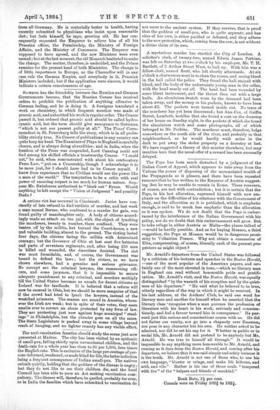Mr. Arnold's departure from the United States was followed by
a criticism of his lectures and speeches in the Boston Herald, —one of the most popular of the American papers, and cer- tainly one of the most elevated in tone,—which no literary man in England can read, without honourable pride and gratifi- cation. Mr. Arnold's visit, said the Boston Herald, was equally distinguished "by the warmth of his reception and by the quiet- ness of his departure." "He said what he believed to be true, utterly regardless of the way in which it might be received. In his last address, at the Authors' Club, he said one word for literary men and another for himself when he asserted that the literary class 'recognise when a man pursues the profession of literature with his heart in his work, seriously and conscien- tiously, and feel a favour toward him in consequence.' He pur- sued just this serious and conscientious course with us. He did not flatter our vanity, nor go into a rhapsody over Emerson, nor pose in any character but his own. He neither asked to be admired, nor did he set his cap for it. Whether in public or in social life, Mr. Arnold did not pretend to be anybody but Mr. Arnold. He was true to himself all through." It would be impossible to say anything more honourable to Mr. Arnold, and coming as it does from the Boston, Herald, and coming after his departure, we believe that it was said simply and solely because it is the truth. Mr. Arnold is not one of those who, to use his own language, "bluster or cringe, and make life hideous, and arid, and vile." Rather is his one of those souls "tempered with fire" of the "helpers and friends of mankind."














































 Previous page
Previous page